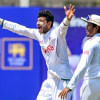When will Hathurusingha take responsibility?

A lack of ambition has clearly surmounted the lack of ability in the Bangladesh national cricket team setup.
The team, evidently, is striving to maintain the mediocre status quo -- an environment where no real ambition can pierce through, with the major stakeholders having no vision to reach excellence.
Exhibit A in this regard is how Bangladesh fluffed an opportunity to reach the semifinals of the T20 World Cup last month for the first time in their history.
Bangladesh needed 116 runs in 12.1 overs against Afghanistan in their last Super Eight contest to guarantee qualification. However, after losing a few wickets, the Tigers abandoned their attempt at fulfilling that equation and instead played for the win.
The reason behind that questionable approach that reeked of a mediocre mentality was later revealed by the skipper Najmul Hossain Shanto in a statement which most took as utter buffoonery, as Shanto said that after Bangladesh lost three wickets in the first three overs, they focused on only winning the game, a victory that would be of no benefit to them.
While Shanto has been copping a lot of flak for this statement, with even the Bangladesh Cricket Board (BCB) president Nazmul Hassan Papon criticising the skipper for it, the person who got the ball rolling in this mediocre path, head coach Chandika Hathurusingha, has seemingly got off scot-free.
After Bangladesh qualified for the Super Eight for the first time since 2007, Hathurusingha stated that the Tigers had achieved their goal in the tournament and whatever came after would be a bonus.
The players' performances in the next two matches reflected the coach's statement as they surrendered against Australia and India without even putting up a fight. And when circumstances presented them with an opportunity that every team could only dream about, the Tigers did not even go all out at taking it, perhaps already satisfied with their 'bonus' phase of the competition.
Since Hathurusingha's re-appointment at the beginning of last year, Bangladesh have played two World Cups– the 2023 ODI World Cup in India and this year's T20 World Cup in North America. He was brought in to streamline a path to the semis in last year's World Cup but instead under his tutelage Bangladesh had one of their worst ever campaigns. In the T20 World Cup, other than a few match-winning efforts from the bowling unit, there wasn't anything to get excited about.
However, these underwhelming displays have hardly mattered as Hathurusingha's job seems to be secure and much like the BCB, his role seemingly demands very little accountability.
In every sport, the coach has to take responsibility along with the players for disappointing campaigns but Hathurusingha seems to be an exception in this regard.
Papon, who is serving his third term as the BCB boss, expressed his satisfaction with the team reaching the Super Eight and with the team ending their campaign with three wins overall – the most ever by Bangladesh in a campaign. He hardly said a word about Bangladesh's appalling batting display, head coach Hathurusingha's role in allowing the team to slip into such mediocrity and the failure of batting coach David Hemp to get the batters out of their slump.
Hathurusingha's evolution as the Bangladesh coach also provides an interesting insight on how a culture of mediocrity effects everyone that's part of it. When he was first appointed as Bangladesh coach in 2015, it seemed that Bangladesh had brought in a top coach who was astute in planning successful campaigns. And impressive results did follow. But almost a decade later, and into his second stint with Bangladesh, it seems that the Sri Lankan has clothed himself in mediocrity and the once result-oriented and stubborn coach has settled himself well into Bangladesh's culture of playing it safe and doing the bare minimum.
BCB has always lacked in long-term vision and when the coach at the helm shares the same attitude, it's a recipe for an unsustainable future filled with uninspiring showings and inevitable mediocrity.
In the T20 World Cup, Bangladesh shook the very foundation of why professional sports is played by consciously choosing to ignore a shot at excellence. It won't be a stretch to assume that the 19 other teams that played in the tournament would go out of their way to achieve excellence if they were presented with the opportunity Bangladesh received.
With another major ICC tournament – the 2025 Champions Trophy – ahead, one would have to be overly optimistic to believe that Bangladesh would fare better with Hathurusingha at the helm.
Now, will the BCB finally demand accountability from Hathurusingha or will they maintain the status quo as raising questions will bring them directly into the firing line?

 For all latest news, follow The Daily Star's Google News channel.
For all latest news, follow The Daily Star's Google News channel. 








Comments